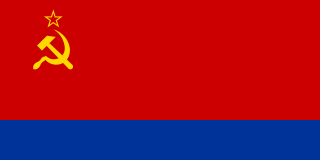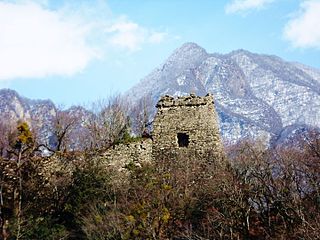Jinli | |
|---|---|
Village | |
| Azerbaijani: Cinli | |
| Coordinates: 40°02′N46°50′E / 40.033°N 46.833°E | |
| Country | |
| District | Agdam |
| Time zone | UTC+4 (AZT) |
| • Summer (DST) | UTC+5 (AZT) |
Jinli (Azerbaijani : Cinli) is a village in the Agdam District of Azerbaijan.
Jinli | |
|---|---|
Village | |
| Azerbaijani: Cinli | |
| Coordinates: 40°02′N46°50′E / 40.033°N 46.833°E | |
| Country | |
| District | Agdam |
| Time zone | UTC+4 (AZT) |
| • Summer (DST) | UTC+5 (AZT) |
Jinli (Azerbaijani : Cinli) is a village in the Agdam District of Azerbaijan.

Azerbaijan, officially the Republic of Azerbaijan, is a transcontinental country at the boundary of Eastern Europe and West Asia. It is a part of the South Caucasus region and is bounded by the Caspian Sea to the east, Russia's republic of Dagestan to the north, Georgia to the northwest, Armenia and Turkey to the west, and Iran to the south. Baku is the capital and largest city.

Baku is the capital and largest city of Azerbaijan, as well as the largest city on the Caspian Sea and in the Caucasus region. Baku is 28 metres (92 ft) below sea level, which makes it the lowest lying national capital in the world and also the largest city in the world below sea level. Baku lies on the southern shore of the Absheron Peninsula, on the Bay of Baku. Baku's urban population was estimated at two million people as of 2009. Baku is the primate city of Azerbaijan—it is the sole metropolis in the country, and about 25% of all inhabitants of the country live in Baku's metropolitan area.

Nagorno-Karabakh is a region in Azerbaijan, covering the southeastern stretch of the Lesser Caucasus mountain range. Part of the greater region of Karabakh, it spans the area between Lower Karabakh and Syunik. Its terrain mostly consists of mountains and forestland.

Azerbaijani or Azeri, also referred to as Azeri Turkic or Azeri Turkish, is a Turkic language from the Oghuz sub-branch. It is spoken primarily by the Azerbaijani people, who live mainly in the Republic of Azerbaijan, where the North Azerbaijani variety is spoken, while Iranian Azerbaijanis in the Azerbaijan region of Iran, speak the South Azerbaijani variety. Azerbaijani has official status in the Republic of Azerbaijan and Dagestan, but it does not have official status in Iran, where the majority of Iranian Azerbaijani people live. Azerbaijani is also spoken to lesser varying degrees in Azerbaijani communities of Georgia and Turkey and by diaspora communities, primarily in Europe and North America.

Heydar Alirza oghlu Aliyev was an Azerbaijani politician who was a Soviet party boss in the Azerbaijan Soviet Socialist Republic from 1969 to 1982, and the third president of Azerbaijan from October 1993 to October 2003.

The Azerbaijan Soviet Socialist Republic, also referred to as the Azerbaijani Soviet Socialist Republic, Azerbaijan SSR, Azerbaijani SSR, AzSSR, Soviet Azerbaijan or simply Azerbaijan, was one of the constituent republics of the Soviet Union between 1922 and 1991. Created on 28 April 1920 when the Russian Soviet Federative Socialist Republic brought pro-Soviet figures to power in the region, the first two years of the Azerbaijani SSR were as an independent country until incorporation into the Transcaucasian SFSR, along with the Armenian SSR and the Georgian SSR.
Azerbaijan is administratively divided into 67 districts and 11 cities that are subordinate to the Republic. Out of these districts and cities, 7 districts and 1 city are located within the Nakhchivan Autonomous Republic. The districts are further divided into municipalities.

The Azerbaijan national football team is the national football team of Azerbaijan and is controlled by Association of Football Federations of Azerbaijan. It represents Azerbaijan in international football competitions. The majority of Azerbaijan's home matches are held at the national stadium, Baku Olympic Stadium, with friendly matches sometimes hosted at club stadiums.

Azerbaijanis, Azeris, or Azerbaijani Turks are a Turkic ethnic group living mainly in the Azerbaijan region of northwestern Iran and the Republic of Azerbaijan. They are predominantly Shia Muslims. They comprise the largest ethnic group in the Republic of Azerbaijan and the second-largest ethnic group in neighboring Iran and Georgia. They speak the Azerbaijani language, belonging to the Oghuz branch of the Turkic languages.

Artsakh, officially the Republic of Artsakh or the Republic of Nagorno-Karabakh, was a breakaway state in the South Caucasus whose territory was internationally recognised as part of Azerbaijan. Between 1991 and 2023, Artsakh controlled parts of the former Nagorno-Karabakh Autonomous Oblast of the Azerbaijani Soviet Socialist Republic, including its capital Stepanakert. It had been an enclave within Azerbaijan from the 2020 Nagorno-Karabakh war until the 2023 Azerbaijani offensive, when the Azerbaijani military took control over the remaining territory controlled by Artsakh. Its only overland access route to Armenia after the 2020 war was via the five kilometres (3.1 mi)–wide Lachin corridor, which was placed under the supervision of Russian peacekeeping forces.

The First Nagorno-Karabakh War was an ethnic and territorial conflict that took place from February 1988 to May 1994, in the enclave of Nagorno-Karabakh in southwestern Azerbaijan, between the majority ethnic Armenians of Nagorno-Karabakh backed by Armenia, and the Republic of Azerbaijan with support from Turkey. As the war progressed, Armenia and Azerbaijan, both former Soviet republics, entangled themselves in protracted, undeclared mountain warfare in the mountainous heights of Karabakh as Azerbaijan attempted to curb the secessionist movement in Nagorno-Karabakh.

The Nagorno-Karabakh conflict is an ethnic and territorial conflict between Armenia and Azerbaijan over the region of Nagorno-Karabakh, inhabited mostly by ethnic Armenians until 2023, and seven surrounding districts, inhabited mostly by Azerbaijanis until their expulsion during the 1990s. The Nagorno-Karabakh region was entirely claimed by and partially controlled by the breakaway Republic of Artsakh, but was recognized internationally as part of Azerbaijan. Azerbaijan gradually re-established control over Nagorno-Karabakh region and the seven surrounding districts.

Hakanlar Çarpışıyor is a Turkish historic action film by Natuk Baytan. It was released in 1977, during the most popular days of the Turkish historic films. The film is about the life of a Turkic warrior named Olcayto, portrayed by Cüneyt Arkın, who is the son of a Kyrgyz chief in Central Asia. When he was a small boy, Chinese troops attack their tribe and kill Olcayto's father. After this event, he decides to take revenge from Chinese warlords. Later, he would find a chance to do so when Chinese form an alliance with a Sheikh from South Asia, who uses all his efforts to kill Olcayto because of the love affair between his daughter and Olcayto.
Cinli Zeynallı is a village in the Goranboy District of Azerbaijan. The village forms part of the municipality of Narimanly.
Cinli Boluslu is a village and municipality in the Goranboy Rayon of Azerbaijan. It has a population of 1,313.

Ilham Heydar oghlu Aliyev is an Azerbaijani politician who is the fourth and current president of Azerbaijan. The son and second child of former Azerbaijani president Heydar Aliyev, Aliyev became the country's president on 31 October 2003, after a two-month term as prime minister of Azerbaijan, through a presidential election defined by irregularities shortly before his father's death. He was reelected for a second term in 2008 and was allowed to run in elections indefinitely in 2013, 2018 and 2024 due to the 2009 constitutional referendum, which removed term limits for presidents. Throughout his electoral campaign, Aliyev was a member of the ruling New Azerbaijan Party, which he has headed since 2005.

Ahmet Mithat was an Ottoman journalist, author, translator and publisher during the Tanzimat period. In his works, he was known as Ahmet Mithat Efendi, to distinguish him from the contemporary politician Midhat Pasha. Ahmet Mithat Efendi took his name from Ahmed Şefik Midhat Pasha, as he worked for a time as an official and newspaper editor in Midhat Pasha's Vilayet of the Danube.

The Second Nagorno-Karabakh War was an armed conflict in 2020 that took place in the disputed region of Nagorno-Karabakh and the surrounding occupied territories. It was a major escalation of an unresolved conflict over the region, involving Azerbaijan, Armenia and the self-declared Armenian breakaway state of Artsakh. The war lasted for 44 days and resulted in Azerbaijani victory, with the defeat igniting anti-government protests in Armenia. Post-war skirmishes continued in the region, including substantial clashes in 2022.

Jinli Castle or Jinli-Gala is a fortress located near the village of İlisu in the Gakh region of Azerbaijan. It was built according to some sources in the 7-9th centuries, according to others - presumably in the 18th century, during the time of continuous invasions and internal conflicts. It is also possible that the fortress was used in the beginning of the 19th century, during the clashes between the Russians and the mountain population. According to the order of the Cabinet of Ministers of the Republic of Azerbaijan on historical and cultural monuments, it constitutes an architectural monument of local importance.
Zeynalli is a surname. It may refer to: